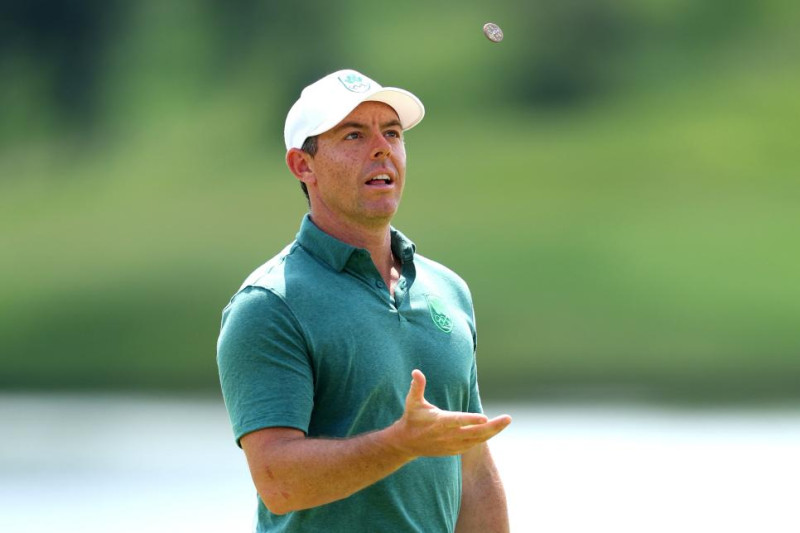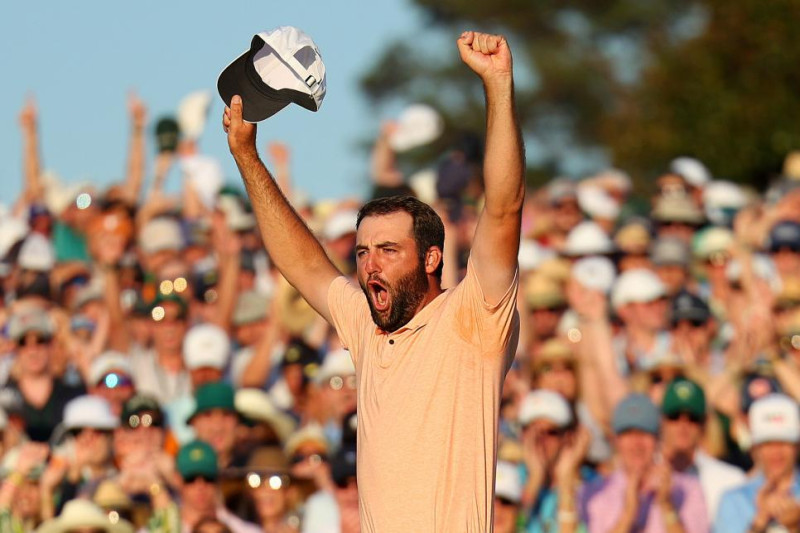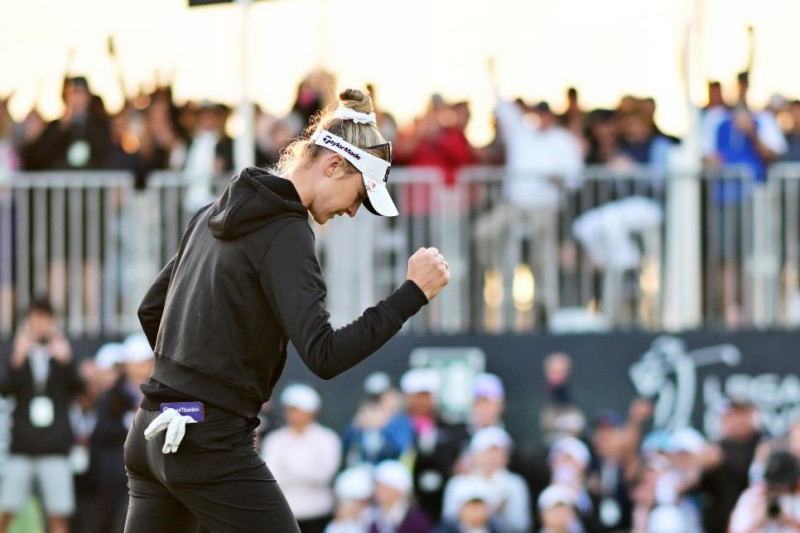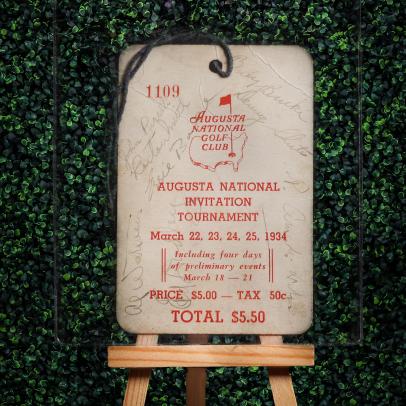Editor's Note: This article first appeared in Power Poll, a Golf Digest content partner.
Money has more often than not dominated the conversation about men’s professional golf in the last few years since LIV Golf launched in 2022 and the PGA Tour desperately reacted to keep up.
In the view of 60 percent of our Power Poll participants, the money escalation has corrupted the focus on the game. It’s a viewpoint some of the wealthiest players on both sides of the PGA Tour/LIV aisle seem to understand after the Men’s Olympic Golf Competition played out last week to universal acclaim with only medals and not money at stake.
“I think with how much of a s—show the game of golf is right now and you think about the two tournaments [Ryder Cup and Olympics] that might be the purest form of competition in our sport, we don’t play for money in it,” said Rory McIlroy, who ranks third behind only Tiger Woods and Phil Mickelson in PGA Tour career earnings exceeding $90 million.
“Two of the most meaningful weeks in my career is two events where we make no money,” said Jon Rahm, who joined LIV for guaranteed money comfortably in nine figures.
Anthony W. Parker, retired historian for NBC Sports, echoed those sentiments.
“I like what Rory had to say about the golf in the Olympics and the Ryder Cup not being about the money but the pride of playing for your country and being pure golf,” Parker said. “If the majors are to be the pinnacle of a golfing career and the golfer's legacy, then the money should not be a determining factor. I do think fans are turned off to the ongoing controversy and apparent greed, but not to the game itself.”
MORE: What a golfer takes home from a $100,000 check
Outgoing R&A CEO Martin Slumbers expressed concern regarding the financial sustainability of the men’s professional game, believing that “the substantial increases” in purses are turning fans away. The Open Championship raised its prize fund to $17 million, a number 6.5 times the size of 25 years ago but still the smallest of golf’s four major championships. The Open purse, in fact, ranked 30th in men’s professional golf in 2024.
The U.S. Open offered the largest purse of the four majors at $21.5 million in 2024, followed by the Masters ($20M) and PGA Championship ($18.5M). The PGA Tour counts 12 non-majors on its 2024 schedule with purses of $20 million or more while all 14 LIV Golf events offer combined purses of $25M ($20M for individual winnings and $5M for the team competition).
“If we take a wider perspective on the game for a second, golf is in many ways riding on the crest of a wave,” said Slumbers of the recreational numbers. “But we have to maintain this momentum. To do that, we must have a sustainable business model in the long term. If you look at golf as a pyramid, however strong the pyramid is at the top, it can only be sustained in the long term if the pyramid is equally strong at the base.
“We see that as our responsibility, and that is why we invest all of the proceeds from the Open back into the sport. We have to be careful to do that in such a way as to ensure that the recreational game is thriving and that the most talented players have a pathway to the top of the game so the professional game of tomorrow flourishes.”
Said golf course architect Tom Doak: “The pro tours define success is terms of dollars. Only the R&A and the USGA have a wider commitment to the game, and it is good to hear Martin Slumbers addressing that in context with the purses at the majors. (Although, of course, he is about to retire.)”
Here’s what our golf Power Poll respondents had to say on the subject of money in the professional game:
1. Has purse escalation in men’s professional golf gone too far and turned off fans?

Andrew Redington
Yes 61% (71)
No 39% (46)
A comfortable majority agree with Slumbers that the money has gone too far and is prompting some fans to tune out.
“The last few years have seen an unfortunate surge in conversation focused on the game's financial side, driven largely by the defections to the LIV blood money, and the diversion in focus has not helped the professional game in the least,” said Bill Hobson, producer/host of Michigan Golf Live. “Fans have expressed disgust and have turned away from the pro game in large numbers, even though the quality of play is as strong as it has ever been.”
But the vocal minority aren’t sure money escalation is chasing fans away.
“First question should have been in two parts,” said Gary McCormick, freelance writer. “As far as I am concerned, yes, prize money has gotten out of hand, but the question of whether it has turned off golf fans is a whole other issue.”
“Have fans stopped watching other sports because the top tier money is ridiculous? Absolutely not,” said Michael Collins, former caddie and senior golf analyst at ESPN. “What drives fans away is when the product is not compelling and/or entertaining. While plenty will complain about millionaires complaining about money, what fans won’t do … is leave because of it.”
MORE: You won’t believe how many golfers have earned $10 million on the PGA Tour without winning an event
“Golf fans will continue to support events provided there is a quality field within the ropes, and that translates across the major sports spectrum,” said Bob Denney, PGA of America historian.
Said Sean Fairholm of MyGolfSpy.com: “Nobody is turning away from golf specifically because the players are getting rich – they are turning away because it’s boring (outside of the majors). The business part of pro golf is getting more attention than the actual play. PGA Tour events feel like a cash funneling system more than an entertainment product. Golfers make less than a lot of other athletes who maximize their earnings any way they can, but other sports capture emotion and belonging on a much deeper level. Golf thrives on personality and characters who are outliers. There are fewer and fewer of them.”
Herb Gould, longtime sports journalist, thinks the surge in golf purses is just par for the course. “Money issues are boggling in just about every sport these days,” he said. “It’s frustrating, but market factors, not rules, will determine where this all is headed. That’s the world we live in.”
“This is still a free enterprise situation,” said Steve Habel, owner/publisher of GolfDaily.com. “ The more money available in purses is – in my opinion – is secondary or even absent in many in the minds of many golf fans.”
MORE: Why Scottie Scheffler will win $8 million without playing this week
2. Do the major championships need to keep pace with the professional tours in terms of prize funds?

Jason Butler
Yes 41% (48)
No 59% (70)
Roger Graves, senior writer/editor of PGA Magazine, believes prestige remains the driving motivation for golfers at the major championships, but that the purse escalation doesn’t have a down-ballot effect on support of the recreational game.
“Golf is close to reaching a saturation point where it cannot sustain additional growth in purses without deteriorating the foundation that supports professional golf in the long term,” Graves said. “How much money is enough money? Golf has reached that tipping point where enough is enough.”
RELATED: Head of R&A expresses worry about pro golf's money increases
“There’s a reason you rarely hear mention of the prize money for a major,” said Bill Hobson. “Those events are legacy-defining and in an age where it seems like everything can be bought, the game is best served when players fight for their place in history instead of the writing on the giant novelty check.”
Ed Travis, contributing editor to Front Page Golf, says the major purse escalation is inevitable.
“To ignore the effect money has on the game is to forget about the growth of purses in sports generally,” he said. “LIV Golf’s entry simply is an expression of the fact to a large extent money drives most sports. Golf’s major purses reflect that and to say anything else is stick one’s head in the sand and wish for some unlikely outcome.”
3. Should the major purses be capped so more money can be invested into the organizations’ other growth initiatives?

Andrew Redington
Yes 59% (70)
No 41% (48)
Slumbers’ concerns resonate at the same rate with our Power Pollsters.
“I agree with Martin (Slumbers) and would like to allow more funds to be used to keep the interest in golf at all levels continuing to be like it is now,” said James McAfee, GWAA life member and writer for Texas Golfer.
Dove Jones of Golf Travel Wire calls the purse escalation “unsustainable” and not capping the prize funds in majors will hurt the mission of golf’s governing bodies. “I keep hearing the pros say they are playing for legacy and trophies not money in the majors,” she said. “The money saved should be reinvested in the sport overall not just the male pro bank accounts.”
Said fellow GWAA member James Davis: “Star power, television and sponsor money ... all these things and more drive the purses. If the interest is there, the money will follow. I’d be sure, though, to keep the base of that golf pyramid well fed. Like a lot things, when it comes to money, seems the top of the pyramid is heavier than the bottom.”
MORE: Undercover Caddie: Professional golf’s civil war has made us rich but at a cost
Longtime golf writer Hank Gola thinks the growth of money pouring into the major championships via broadcast rights and patron support can sustain both higher purses and growth initiatives.
“Prize fund money is largely dependent on the sale of broadcast rights and what the free market bears,” Gola said. “That said, I don’t believe any player is going to bypass playing in a major because the prize money is any less and I don’t believe a significant number of golf fans will lose interest if the purse is ‘too high.’ … As for ‘the bottom of the pyramid,’ grassroots initiatives by the USGA and PGA of America, at least, have been on the rise and have not suffered from any lack of funding.”
4. Should women’s major championships pay out the same purses as the men’s majors in the same way tennis does at its grand slam events?

Julio Aguilar
Yes 44% (52)
No 56% (66)
This is a sticky subject and the closer split in poll respondents shows how mixed opinions are regarding equal compensation for women at the majors. Unlike tennis, where the grand slam events are played concurrently and the ratings and interest have long been comparable for both, golf does not have similar balance in interest.
“If pro golfers want to earn movie-star millions, they’ve got to be willing to live and die by the rules of show business,” said longtime Philadelphia golf writer Joe Logan, co-founder of MyPhillyGolf.com. “Those rules say it doesn’t matter whether you’re a man or a woman, only how many butts you put in the seats and eyeballs on the screen.”
Said Sports Illustrated golf writer Gary Van Sickle: “Nothing is stopping the LPGA from having the same purses as men’s majors. Go out and find the sponsors. TV ratings and ad surveys show that women’s golf has less than one-tenth as much public interest as men’s golf. The money follows the viewers and ratings.”
MORE: The Unknowable Nelly Korda: What does the superstar owe her sport?
Others feel strongly that golf’s governing bodies that run the majors need to look beyond ratings and attendance when it comes to paying the participants in major champions equally based on merit.
“Purse equity is not just a good idea, but should be a requirement,” said Dave Lucas, news anchor at WJLA-TV in Arlington, Virginia. “Tennis did that a long time ago when that sport was riding a popularity wave. Golf’s on that trajectory now. But don’t confuse total audience size with the demos. It’s all about who’s watching, not just how many. Women’s golf has terrific demographics for advertisers.”
Dove Jones feels passionately about the subject of purse equality in the majors.
“I agree LPGA regular events can have lower purses, but when it comes to the USGA, R&A and PGA (of America) MAJORS, they are EQUALLY responsible for women and men,” she said. “I don’t pay lesser dues to the USGA. … The goal is to grow the SPORT overall across gender, age, geography and the fastest growth segment right now is the female side. Equity in purses would go a long way to getting and keeping female interest. And as Dave Lucas points out, women are a great market for high-end advertisers. Even the USOC finally paid out equal for male/female (Olympic) medal winners.”
More From Golf Digest+
 Is golf vulnerable to a gambling scandal?
Is golf vulnerable to a gambling scandal?
 masters history
How a $470k 1934 Masters badge ended up across the street from Augusta National
masters history
How a $470k 1934 Masters badge ended up across the street from Augusta National
 5 golfers who beat the odds to become Olympians
5 golfers who beat the odds to become Olympians